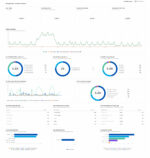Big Data has taken the technology world by storm, but what is the potential value and implications that could come from Big Data?
In January, President Obama asked senior advisor John Podesta to lead a comprehensive review on how data collection and analysis are affecting citizens’ privacy. Today, Podesta and his comprehensive review team are ready to present their findings.
“We knew better than to try to answer every question about Big Data in three months,” Podesta wrote on the White House blog. “But we are able to draw important conclusions and make concrete recommendations for Administration attention and policy development in a few key areas.”
Podesta and his working group found that while Big Data is saving lives, making the economy work better and saving taxpayer dollars, it raises some serious concerns about privacy.
“In particular, our review raised the question of whether the ‘notice and consent’ framework, in which a user grants permission for a service to collect and use information about them, still allows us to meaningfully control our privacy as data about us is increasingly used and reused in ways that could not have been anticipated when it was collected,” he wrote.
Big Data tools can change the balance of power between government and citizens, according to the group. It can provide benefits that improve service delivery or detect payment fraud, but it also has the potential to chill free speech or free association, the group said.
The group also found that Big Data tools could leak intimate personal information and lead to discriminatory outcomes.
As a result of their findings, the working group made six actionable policy recommendations:
• Advance the Consumer Privacy Bill of Rights: “Consumers deserve clear, understandable, reasonable standards for how their personal information is used in the Big Data era.”
• Pass national data breach legislation: “Congress should pass legislation that provides for a single national data breach standard, along the lines of the Administration’s 2011 Cybersecurity legislative proposal.”
• Extend privacy protections to non-U.S. persons: “The Office of Management and Budget should work with departments and agencies to apply the Privacy Act of 1974 to non-U.S. persons where practicable, or to establish alternative privacy policies that apply appropriate and meaningful protections to personal information, regardless of a person’s nationality.”
• Ensure data collected on students in school is used for educational purposes: “Big Data and other technological innovations, including new online course platforms that provide students real-time feedback, promise to transform education by personalizing learning.”
• Expand technical expertise to stop discrimination: “The federal government’s lead civil rights and consumer protection agencies should expand their technical expertise to be able to identify practices and outcomes facilitated by Big Data analytics that have a discriminatory impact on protected classes, and develop a plan for investigating and resolving violations of law.”
• Amend the Electronic Communications Privacy Act: “Congress should amend ECPA to ensure the standard of protection for online, digital content is consistent with that afforded in the physical world—including by removing archaic distinctions between e-mail left unread or over a certain age.”
“No matter how quickly technology advances, it remains within our power to ensure that we both encourage innovation and protect our values through law, policy, and the practices we encourage in the public and private sector,” Podesta wrote.
The working group that set out with Podesta to take a look at Big Data included Secretary of Commerce Penny Pritzker, Secretary of Energy Ernest Moniz, the President’s Science Advisor John Holdren, the President’s Economic Advisor Jeff Zients, and other senior officials.
The full report is available here.






